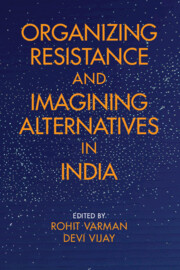Book contents
6 - The Wire and Circuits of Resistance: Immersions in the Slowness of Democratic Time and De-naturalizing the Present
Published online by Cambridge University Press: 30 June 2022
Summary
Jawaharlal Nehru University (JNU) is one of the most important public universities in India and is a site for nurturing critical thought and scholarship. On 9 February 2016, some students had organized a meeting in JNU to protest against the hanging of Afzal Guru, a Kashmiri separatist (The Hindu, 2016). Afzal Guru was a Kashmiri who was awarded the death sentence after being convicted of conspiracy to attack the Indian Parliament on 13 December 2001 (Tripathi, 2013). The Indian Supreme Court upheld his death sentence, and he was subsequently hanged on 9 February 2013. Several human rights organizations, activists, and lawyers alleged that Afzal Guru was denied a fair trial, and the police extracted his confessions under duress and torture (Roy, 2013). On the third death anniversary of Afzal Guru, a group of students in JNU had organized a cultural program to voice their dissent against his judicial killing and express their solidarity with the struggle of Kashmiri people (The Hindu, 2016). Akhil Bharatiya Vidyarthi Parishad (ABVP), the student wing of the ruling Hindu nationalist political formation, the Bharatiya Janata Party (BJP), protested against the programme organized by the JNU students (Sen, 2016).
Some news channels with leanings towards the BJP's Hindu nationalist politics whipped up a frenzy by repeatedly telecasting the ABVP's allegation that JNU students had shouted anti-national slogans during the protests on 9 February 2016 (Varadarajan, 2016). Rajnath Singh, the Home Minister of India, tweeted that the students who organized the protest on 9 February 2016 had connections with terror organizations in Pakistan (Sen, 2016). Later, forensic evidence raised serious questions about the veracity of the video footage showing JNU students shouting anti-national slogans and the basis of the Home Minister's tweet. The Home Minister had relied on a parody Twitter account, which resembled the name of a Pakistani terrorist, Hafiz Saeed (Varadarajan, 2016). Despite lack of concrete evidence, the Delhi Police, which functions under the administrative control of the Union Home Ministry, arrested Kanhaiya Kumar, the president of the JNU Student's Union and charged him with sedition (The Hindu, 2016).
JNU students, academics from all over the world, civil society organizations, and opposition political parties protested against Kanhaiya Kumar's arrest, even as Kumar himself denied raising any anti-national slogans (Varadarajan, 2016).
- Type
- Chapter
- Information
- Organizing Resistance and Imagining Alternatives in India , pp. 177 - 212Publisher: Cambridge University PressPrint publication year: 2022



